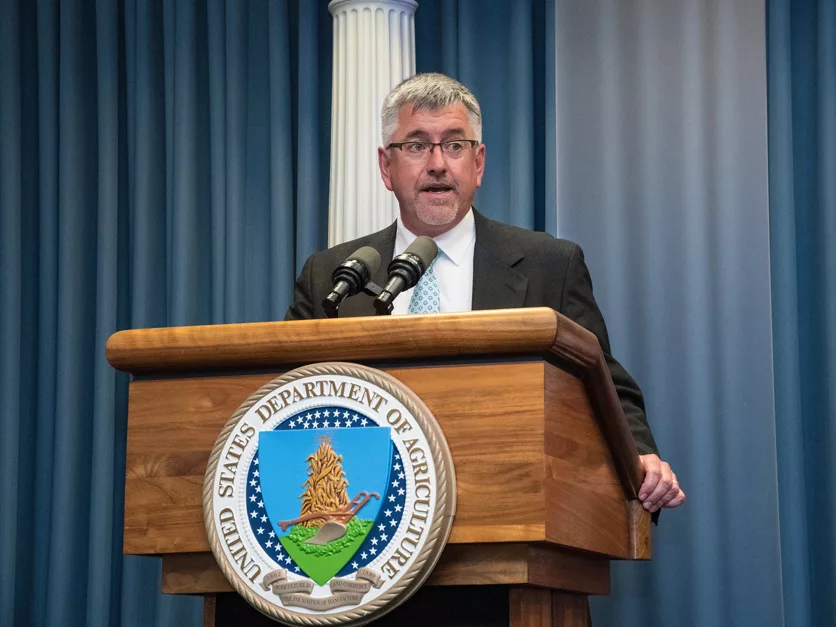Key Takeaways
- Senate Ag Committee advanced nominations for Richard Fordyce and Michael Boren, with bipartisan support for Fordyce.
- Trump administration’s trade pact with the EU aims to eliminate tariffs on agricultural products, easing trade tensions.
- Democrats raise concerns over USDA’s removal of ‘socially disadvantaged’ designation for minority and women farmers.
USDA Nominations Await Senate Confirmation
The Senate Agriculture Committee has advanced the nominations of Richard Fordyce for undersecretary of farm production and conservation, and Michael Boren for undersecretary of natural resources and environment. Fordyce received bipartisan support, passing with a 19-4 vote. In contrast, Boren’s nomination faced party-line opposition due to past disputes with the Forest Service in Idaho, though specifics were not disclosed by committee Democrats, particularly Sen. Amy Klobuchar.
Senate Majority Leader John Thune has expedited the review process for Tyler Clarkson, nominated as USDA’s general counsel. Other nominees awaiting Senate action include Luke Lindberg, Dudley Hoskins, and Scott Hutchins in various undersecretary roles.
Trade Pact with EU Boosts U.S. Agriculture
Recent developments in trade have seen some agricultural organizations welcoming the Trump administration’s trade agreement with the European Union. The agreement, reached on Sunday, averted a significant increase in tariffs on EU exports and committed both parties to eliminate certain tariffs on agricultural products and collaborate on expanding pork and dairy exports.
Leaders in agriculture have emphasized the necessity of addressing long-standing trade issues with the EU. Corn Refiners Association President John Bode expressed that the framework is a crucial step towards removing barriers that have hampered American agricultural exports.
Dairy Sector Challenges International Practices
During a U.S. International Trade Commission (ITC) hearing, representatives from the dairy sector stressed the adverse impact of foreign subsidies on U.S. exports, particularly focusing on governmental practices in India, Turkey, and Canada. The National Milk Producers Federation highlighted how Canadian pricing mechanisms and subsidies disadvantage U.S. producers. The ITC is collecting information to prepare a public report on U.S. competitiveness set for 2026.
Food Security in Gaza and U.S. Responses
In response to worsening hunger in Gaza, President Trump announced plans to establish food centers, highlighting the dire situation amid ongoing access issues due to Israeli blockades since March. Although the blockade was temporarily lifted, aid organizations continue to report significant concerns about potential famine conditions.
The United Nations’ recent report shows that while global hunger has slightly declined, regions like Africa and western Asia continue to experience severe food insecurity.
Concerns over USDA Policy Changes
A group of 34 House Democrats has criticized the USDA’s recent decision to stop designating minority and women farmers as “socially disadvantaged.” They argue that this change undermines the recognition of ongoing discrimination within the agricultural sector. The lawmakers have requested that USDA provide data that informed this decision and detail how it plans to prevent discrimination in program benefits.
Dairy Antitrust Settlement Proposal
Dairy Farmers of America and Select Milk Producers Inc. have agreed to a $34.4 million settlement regarding an antitrust lawsuit initiated by Southwestern dairy farmers. The lawsuit alleged price-fixing practices to suppress farmer earnings. The proposed settlement includes dissolving a joint venture deemed central to the alleged conspiratorial activities, pending judicial approval.
New Conservation Survey by NASS
The National Agricultural Statistics Service is set to gather data on producers’ conservation activities through an upcoming survey. This initiative aims to assess the use of conservation practices and inform future programs by the Natural Resources Conservation Service.
Urgency of Resolving Global Hunger
World Food Programme Executive Director Cindy McCain emphasized the critical funding shortfalls hindering efforts to combat global hunger, citing last year’s achievements and current budget cuts that could severely limit assistance capabilities.
The content above is a summary. For more details, see the source article.















